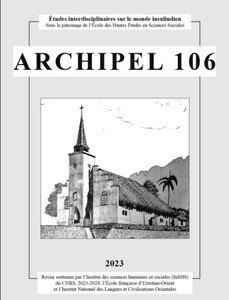Setyo Wibowo, Augustinus (2023) Konversi Yesuit Indonesia pada Sukarnoisme: Pemihakan pada Pancasila. Archipel, 106. pp. 179-203. ISSN 0044-8613
![[img]](http://repo.driyarkara.ac.id/1934/1.hassmallThumbnailVersion/CoverARCHIPEL.jpg)
|
Image (Journal Cover Image)
CoverARCHIPEL.jpg - Cover Image Download (52kB) | Preview |
|
|
Text (Journal Article)
ARCHIPEL KonversiYesuit.pdf - Published Version Download (566kB) |
Abstract
Le principe de neutralité religieuse trouvé dans le premier principe de Pancasila, est la pensée originale de Sukarno, le père fondateur de la République d’Indonésie. Sukarno cultivait ce germe du patriotisme religieux non exclusif dans les années 1920 et 1930 (lorsqu’il fut exilé sur l’île catholique de Flores). Dans le même temps, sous la direction du père jésuite Van Lith SJ, un petit groupe de catholiques de Java a grandi dans des idées patriotiques. L'évolution politique dans les années 1930 et en particulier l’occupation japonaise (1942-1945) ont amené la minorité catholique de Java à s'impliquer pleinement dans le mouvement pour l'indépendance de l'Indonésie. Monsieur Kasimo et le jésuite Mgr. Soegijapranata SJ étaient deux des étudiants de Van Lith qui ont intégré les catholiques dans un nouveau pays appelé l'Indonésie. La contribution la plus importante de la minorité catholique a été trouvée dans l'interprétation du Pancasila par Nicolas Driyarkara SJ, qui a été largement acceptée en Indonésie dans les années 1960. Selon ce prêtre jésuite, Pancasila est un principe d'État qui donne à la religion une place très importante sans pour autant faire de l'Indonésie un État religieux. Mots-clés : Pancasila, Patriotisme, Jésuite, Religion Abstrak: The principle of religious neutrality found in the first principle of Pancasila, is the original thought of Sukarno, the founding father of the Republic of Indonesia. Sukarno cultivated this seed of non-exclusive religious patriotism in the 1920s and 1930s (when he was exiled to the Catholic Island of Flores). At the same time, under the leadership of Jesuit Father Van Lith SJ, a small group of Catholics in Java grew up with patriotic ideas. Political developments in the 1930s and particularly Japanese’s occupation (1942–1945) led Java's Catholic minority to become fully involved in the movement for Indonesian independence. Mr. Kasimo and the Jesuit Mgr. Soegijapranata SJ were two of Van Lith's students who integrated the Catholics in a new country called Indonesia. The most important contribution of the Catholic minority was found in the interpretation of Pancasila by Nicolas Driyarkara SJ, which gained wide acceptance in Indonesia in the 1960s. According to this Jesuit priest, Pancasila is a state principle that gives religion a very important place without making Indonesia a religious state. Keywords: Pancasila, Patriotism, Jesuit, Religion.
| Item Type: | Article |
|---|---|
| Subjects: | B Philosophy. Psychology. Religion > B Philosophy (General) A General Works > B Philosophy. Psychology. Religion > B Philosophy (General) J Political Science > JC Political theory |
| Divisions: | Program Sarjana > Program Studi Filsafat |
| Depositing User: | ThM .- |
| Date Deposited: | 11 Oct 2024 01:54 |
| Last Modified: | 11 Oct 2024 01:54 |
| URI: | http://repo.driyarkara.ac.id/id/eprint/1934 |
Actions (login required)
 |
View Item |


